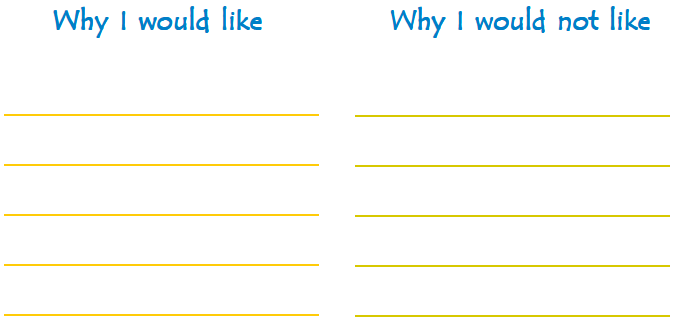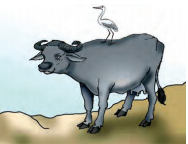NCERT Solutions Class 4 EVS Chapter 3 is one of the most exciting chapters in the syllabus. With questions regarding a baby named Nandu and its interest in riding animals, this exciting chapter brings along a series of easy-to-solve questions and fun topics. Students can download the NCERT Solutions from the links given below.
NCERT Solutions for Class 4 EVS Looking Around Chapter 3 A Day with Nandu
Access NCERT Solution for Class 5 EVS Chapter 3
Page No: 21
Find out
1. Nandu is only three months old, but he weighs 200 kilograms. What is your weight?
Answer:
My weight is 20 kg.
2. Can you find out – the weight of how many children like you will add up to Nandu’s weight?
Answer:
Nandu’s weight equals the sum of 10 children of my weight.
Fun and Games
1. If you were Nandu, and you lived in a herd, what kind of things would you do?
Answer:
If I were Nandu living in a herd, I would play, dance and eat for an entire day. Later that night, I would sleep with my mother.
2. In the elephant herd, the oldest female elephant decides everything. Who takes decisions in your family?
Answer:
Both my parents together take most of the decisions in my family.
3. Nandu did things that he liked to do. If you could spend a whole day with your friends, what all would you do?
Answer:
I would like to play games, sing, dance, tell and listen to funny stories, eat and have lots of fun if I could spend a whole day with my friends.
4. Find out and write, which other animals live in herds
Answer:
Other animals that live in herds are deer, cows, horses, zebra, sheep, penguins, rhinos etc.
5. Do you also live in a group? Do you like to live together like that? Why would you like or not like to live in a group?

Answer:
Yes, in school and at home, I am always in a group of my friends and family, respectively.
| Why I would like | Why I would not like |
| – We can talk to people as they are around us.
– We can share our feelings instantly. – Cost of living can be reduced by sharing things. – We feel safe and secure when in a group. – We can help and get help to do different tasks. |
– It can lead to quarrels and fights over small things
– There is less or no privacy. – More space is required for all persons in the group. – We have to adjust ourselves according to others. – Differences of opinions can lead to separation of the group. |
6. How do elephants feel when they are kept in chains? Discuss and share your feelings.
Answer:
When elephants are kept in chains, they feel restrained and are unable to do anything. This will make the elephant feel sad and unhappy. Due to this, the elephant may react aggressively or lie down around feeling depressed because of their lack of activity. I strongly feel that just like any other living being, elephants, too, desire freedom, and they should not be chained.
7. Have you ever taken a ride on an elephant? How did it feel?
Answer:
Yes, I have taken a ride on an elephant, and it felt thrilling and exciting.
8. Which animals have you sat on? Write their names.
Answer:
I have sat on horse, elephant, camel and buffalo.
9. You must have seen many animals around you – in books, in movies. Some may be alone, some in groups. Find out more about any one of these animals and write about it.
Answer:
I mainly see dogs around me. They sleep during the day for 4 – 5 hours. They eat meat, rice, milk, bread, etc. As they are active during the night, they give security from thieves and also keep an eye on our homes. If anything abnormal happens, they will attack or start barking loudly. Female dogs give birth to babies, which are called puppies.
Think and Write

1. Why do you think the egret is sitting on the buffalo?
Answer:
The egret sits on a buffalo to eat flies, grasshoppers and other pests on the buffalo. In this way, the egret gets its food, as well as the buffalo, gets rid of germs and dirt. Hence, it’s a mutual benefit for both.
2. Have you seen any animal riding on another animal? Write its name.
• The animal which is riding.
• The animal which gives the ride.
Answer:
Yes, I have seen an oxpecker sitting on a zebra.
Hence, the animal which was riding was the oxpecker, and the one which gave a ride was the zebra.
3. Which animals do we use for riding?
Answer:
Animals used for riding are horses, camels, donkeys, camels and yak.
4. Which animals do we use for carrying loads?
Answer:
For carrying loads, buffalos, elephants, horses, donkeys, yak and camels are used.
What Do They Say?
Discuss
1. You have read what these animals say. Why do you think that some of them are sad?
Answer:
Some of the animals are sad as they are separated from their natural habitats. They are captured and put in circuses to entertain people, where they are brutally treated to obey their master’s order. Hence, these animals are feeling sad because they have lost their freedom to live or survive.
2. How do you think they are different – the monkeys that dance to entertain people and the monkeys that are free?
Answer:
Yes, they both are different. The monkeys that are free are happier in comparison to those that dance to entertain people. Capturing animals and using them for our own benefit is against their wish. It makes them feel unhappy and depressed.
The Class 4 EVS Chapter 3 NCERT Solutions – A Day With Nandu contains questions such as the following:
- If you were in place of Nandu, what would you like to do?
- Which animals have you sat on?
The above were a few questions from the chapter. If you wish to know more, view the solutions below




Comments